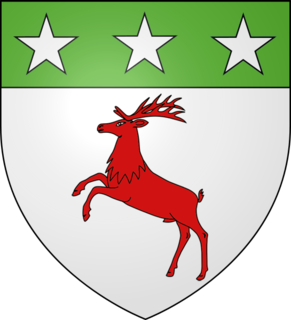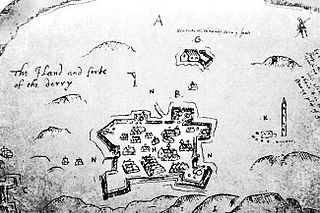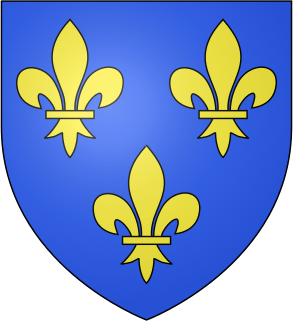| |||||
| Centuries: | |||||
|---|---|---|---|---|---|
| Decades: | |||||
| See also: | Other events of 1608 List of years in Ireland | ||||
Events from the year 1608 in Ireland.
| |||||
| Centuries: | |||||
|---|---|---|---|---|---|
| Decades: | |||||
| See also: | Other events of 1608 List of years in Ireland | ||||
Events from the year 1608 in Ireland.

Niall Garve O'Donnell was an Irish chieftain, alternately an ally of and rebel against English rule in Ireland. He is best known for siding with the English against his kinsman Hugh Roe O'Donnell during the Nine Years' War in the 1590s.

The O’Doherty family is an Irish clan based in County Donegal in the north of the island of Ireland.

Sir Cahir O'Doherty was the last Gaelic Chief of the Name of Clan O'Doherty and Lord of Inishowen, in what is now County Donegal. O'Doherty was a noted loyalist during Tyrone's Rebellion and became known as the Queen's O'Doherty for his service on the Crown's side during the fighting. After the war O'Doherty had ambitions to become a courtier and applied for a position in the household of Henry Frederick, Prince of Wales, but he increasingly came into dispute with Irish-based officials such as the Viceroy Sir Arthur Chichester and the Governor of Derry Sir George Paulet. In 1608 he launched a rebellion, seizing Derry from Paulet and burning it to the ground. O'Doherty was subsequently killed in a battle at Kilmacrennan, and the rebellion swiftly collapsed.

George Montgomery (1562–1621) was a Scottish protestant cleric, promoted by King James VI and I to various Irish bishoprics. He held the offices of Rector of Chedzoy, Somerset; Dean of Norwich (1603); Bishop of Raphoe, Bishop of Clogher, Bishop of Derry (1605); and Bishop of Meath (1610).
Sir George Paulet (1553–1608), also known as Pawlet or Powlet, was an English soldier, administrator, and governor of Derry who was killed by the followers of Sir Cahir O'Dogherty during O'Doherty's Rebellion. After his death, Paulet's command at Derry was burned to the ground by the rebels. Paulet was knighted in 1607.

O'Doherty's rebellion took place in 1608 when Sir Cahir O'Doherty, lord of Inishowen, began an uprising against the Crown authorities in the west of Ulster in the north-west of the Kingdom of Ireland. O'Doherty, a Gaelic chieftain, had been a long-standing supporter of the Crown, but having been angered at his treatment by local officials he launched an attack on Derry, burning the town. O'Doherty may have hoped to negotiate a settlement with the government, but, after his death in a skirmish at Kilmacrennan, the rebellion collapsed with the last survivors being besieged on Tory Island.

Mongavlin Castle also known as Mongevlin Castle is a ruined castle on the west bank of the River Foyle, approx 3 km south of St Johnston, County Donegal, Ireland. It was once a stronghold of the O'Donnell's, Lords of Tyrconnell.
The Treaty of Mellifont, also known as the Articles of Mellifont, was signed in 1603 and ended the Nine Years' War which took place in the Kingdom of Ireland from 1594 to 1603.

Henry Docwra, 1st Baron Docwra of Culmore was a leading English-born soldier and statesman in early seventeenth-century Ireland. He is often called "the founder of Derry", due to his role in establishing the city.

The Battle of Kilmacrennan was a skirmish fought near Kilmacrennan, County Donegal in 1608 during O'Doherty's Rebellion. Sir Cahir O'Doherty was a traditional supporter of the Crown whose treatment at the hands of local officials had led him to launch a rebellion in which he had seized the garrison town of Derry, killing his enemy George Paulet. O'Doherty raised local forces and possibly hoped to negotiate an agreement with the government as had been common with leaders of previous rebellions.

The Burning of Derry took place on 19 April 1608 during O'Doherty's Rebellion when Sir Cahir O'Doherty led a force of rebels to storm Derry in Ulster. He launched his rebellion with an attack on the garrison town of Derry, which was taken thanks to the element of surprise. The town was then almost entirely destroyed by fire.

Burt Castle is a ruined castle located close to Newtowncunningham and Burt, two villages in the east of County Donegal in Ulster, Ireland. Historically it was sometimes spelt as Birt Castle. It is also known by the name O'Doherty's Castle, and should not be mistaken for O'Doherty's Keep near Buncrana.
Henry Hart (1566-1637) was an Anglo-Irish soldier and landowner of the Elizabethan and early Stuart eras. He served in the Nine Years' War (1584-1603) and was later involved in the opening incident of O'Doherty's Rebellion in 1608. As a servitor he acquired an estate in County Donegal.

Phelim Reagh MacDavitt or Phelim Reagh MacDevitt was a Gaelic Irish warrior and landowner notable for his participation in the Nine Years War and later in O'Doherty's Rebellion in 1608. After playing a leading part in the Burning of Derry, he was captured and executed following the Battle of Kilmacrennan.
Hugh Boy MacDavitt was a Gaelic Irish warrior from Inishowen. He was the brother of Phelim Reagh MacDavitt and the foster brother of Sir Cahir O'Doherty. Cahir had a strong claim to succeed as chief of the O'Doherty's, the dominant clan on Inishowen. Because of this he was captured by Red Hugh O'Donnell, who supported a rival candidate. The MacDavitt brothers succeeded in rescuing him. They had previously sided with the rebels during the Nine Years War, with Hugh Boy making a failed attempt to capture Culmore Fort. They now switched to support the Crown and allied themselves to Sir Henry Docwra, the English Governor of Derry.
Sir Turlough MacShane O'Neill was an Irish landowner. He was part of the powerful Gaelic O'Neill Dynasty of Ulster. He was a great grandson of Shane O'Neill, who had once been chief of the O'Neills before his death in 1567. Turlough's branch of the family had served on the Crown's side against their cousin Hugh, Earl of Tyrone, during Tyrone's Rebellion (1594-1603). They were rewarded with land around Kinnaird in County Tyrone.
Rosa O'Neill was a member of the O'Doherty family of County Donegal who lived during the late Tudor and Stuart eras.
Cathbarr O'Donnell was an Irish nobleman.
Sir Richard Hansard was an English-born soldier who served and settled in Ireland during the Tudor and Stuart eras. He fought for the Crown during Tyrone's Rebellion, during which he was given command of the key town of Ballyshannon in County Donegal.
Donnell Ballagh O'Cahan was an Irish landowner in Ulster. A vassal of Hugh O'Neill, Earl of Tyrone, O'Cahan was frequently in rebellion alongside his lord in the closing years of the 16th century. Although he did not go into exile with Tyrone, he claimed to have been betrayed by the English Crown, which he accused of failing to keep to an agreement over a large grant of lands. Arrested for treason, he was never brought to trial but was held captive in Dublin Castle until his death sometime around 1627.